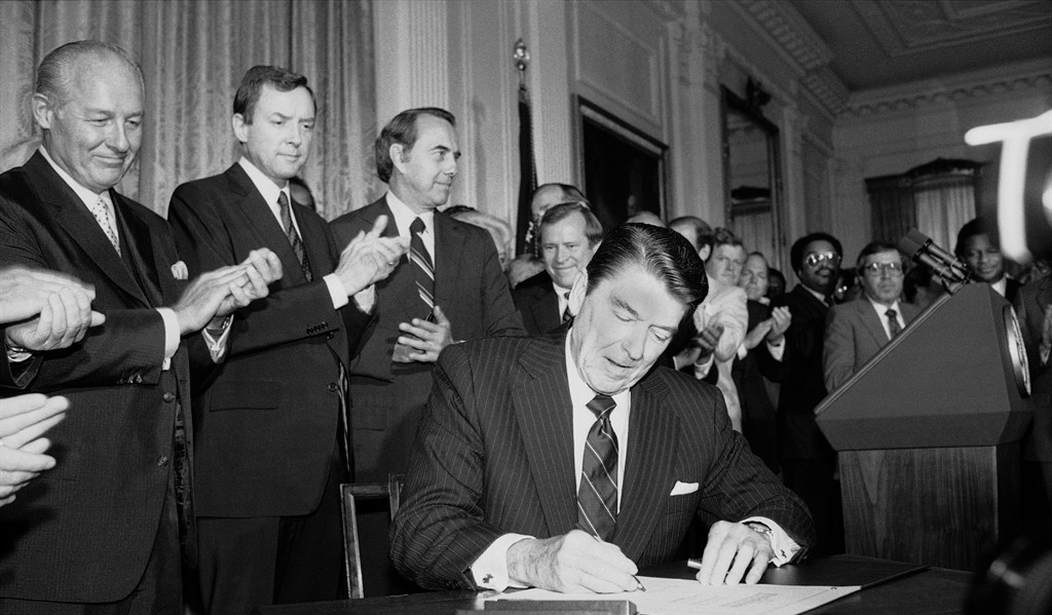It's October and a congressional minority party is hoping to use the impending need for a debt limit increase to force the majority party, including the President, into major budget negotiations. Observers worry that this will spook the economy and, moreover, that the debt limit is such a potent piece of leverage that it's better not to use it.
It could be 2013. It could also be 1986.
President Obama recently said,
“You have never seen in the history of the United States the debt ceiling or the threat of not raising the debt being used to extort a president or a governing party and trying to force issues that have nothing to do with the budget and nothing to do with the debt.”
President Obama is wrong. The debt ceiling is an incredibly potent piece of leverage - perhaps so potent that no minority party should ever use it to try to extract concessions from the majority - but this is a time-tested piece of leverage that has been used by minority parties for decades. The United States has never defaulted due to a failure to increase the debt limit, but the use of the debt limit as political leverage is well-tread ground.
President Reagan dealt with Democrats in Congress using the debt limit to extract budget concessions multiple times. From 1985 to 1987, there were short-term debt limit increases passed, 11th-hour compromises, "extraordinary measures" used by the Treasury Department in order to extend the federal government's borrowing power, veto threats, demands for clean hikes, and, eventually, grand budget bargains.
In 1985, a "clean" debt limit increase was never really on the table. While a clean increase benefits the majority party - the governing party has to deal with fallout from default, after all - the majority GOP acknowledged that a large budget deal was necessary to deal with America's fiscal future. Democrats wanted to use the impending debt limit to force tax hikes and military spending cuts.
Recommended
In October 1985, Democrats refused to pass a long-term debt limit hike because they wanted to use the issue to force multiple showdowns over the budget in coming months. The threat of a filibuster was enough to stall a grand budget bargain, and the Treasury Department was able to enact emergency procedures - including raiding the Social Security "trust fund" - in order to extend the government's ability to pay its bills.
The standoff lasted over a month, with multiple exhortations from President Reagan to get a deal done. On November 14, 1985, Congress approved a temporary measure, buying enough time to pass a grand budget bargain - the bipartisan Gramm-Rudman-Hollings deficit reduction measure - which included a controversial spending cut measure known as sequestration.
Debt limit peace lasted a good seven months after that bitter fight. The debt limit was on pace to be hit at the end of summer 1986; in mid-August, lawmakers passed another temporary debt limit extension in order to work on another long-term grand bargain. But both sides wanted a solution to a problem they had created in the last go-round: a major part of the deficit-reduction Gramm-Rudman-Hollings measure had been declared unconstitutional by the Supreme Court in July. Bipartisan agreement in the Senate produced a White House-endorsed fix to Gramm-Rudman-Hollings, but House Democrats stood in the way. The House added additional measures to the Gramm-Rudman-Hollings fix that they knew the White House would reject - like significant cuts to military spending. Another standoff occurred. A Gramm-Rudman-Hollings fix would not happen this time around.
A six-month debt limit increase was finally attached to an omnibus budget bill on October 17, 1986. The Reagan White House "raised several objections" to the bill, but went along with the legislation despite its objections. The Reagan White House knew enough to compromise on the debt limit.
The 1986 midterm elections finally gave the Senate back to Democrats, giving them complete control of Congress. Emboldened by the debt limit fights of the last two years, Congressional Democrats would hold the debt limit - and the Reagan Administration - hostage to their demands. The Gramm-Rudd-Hollings "fix" that Democrats had been angling for - increases in tax revenue and cuts to defense spending - would finally be theirs.
Democrats would proceed to wrangle amongst themselves as to exactly the composition of their list of tax hikes and military spending cuts to extract from the President to attach to a debt limit increase. They passed a series of short-term increases - including one that lasted merely a week, from July 29, 1987, to August 6, 1987 - while they hammered out the terms of their ransom.
This flew in the face of a plea from President Reagan to pass a "clean" increase. The bill that Reagan saw being crafted by Congressional Democrats, he said, "is an attempt to force me to either sign a tax bill or to accept massive cuts in national defense, or both. But the choice is for the United States to default on its debts for the first time in our 200-year history, or to accept a bill that has been cluttered up."
Pleas from POTUS were for naught. The final bill that was shepherded through the Democratic Congress managed to get significant amounts of moderate Republican support. The bill that arrived on President Reagan's desk contained a budget that called for tax increases and cuts to national security, but also contained what would be the largest debt limit increase in history. In what the Washington Post described as an "unusual seven minute ceremony," President Reagan signed the Democrats' bill - and called it "blackmail."
There would be eight increases in the debt limit from 1985-1987. In 1987 alone - when Democrats had Congress under their unified control - there were four increases in the debt limit, as Congress hopped from short-term crisis to short-term crisis in order to put pressure on the Reagan Administration to adopt their policy preferences.
During this period of crisis governance, both Republicans and Democrats believed that the debt limit was an effective tool to bring each other - and the White House - to the table to negotiate on larger budget deals. When Democrats gained total control of Congress, they finally saw that they did not even need to negotiate: they forced President Reagan into accepting their policy choices in exchange for a debt limit increase. There's one aspect that differentiates this period from today: the debt limit brinksmanship in Congress was shared by both parties despite the Republicans controlling the White House. That's to be expected - party coalitions were less monolithic in the 1980s. The hardening of party divisions, both left and right, of the last thirty years has produced the situation that we see today.
The primary determinant of debt limit grandstanding and brinksmanship throughout history is party control. A 1993 Public Administration Review article by University of Missouri-St. Louis professors Linda Kowalcky and Lance LeLoup makes this explicit.
Party control of Congress and the presidency... is the crucial variable in explaining voting alignments on debt legislation. The majority party in Congress - particularly under unified party control of government - is responsible for governing, including the obligation to pay the nation's bills. In contrast, the minority party has no such obligation and instead has an opportunity to score political points and establish a public record against government borrowing.
The authors wrote that "this is particularly true of House Republicans," but that was at a time before the 1994 revolution and theorized that the GOP's permanent-minority status contributed to their grandstanding on the debt ceiling. "Party control of the White House is also important," the authors write, "as members are likely to be less critical when the proposal comes from a President of their party... House Democrats were either divided or tended to support the President regardless of his party and, except during Republican control in the 1980s, Senate Democrats tended to support raising the limit."
"By the 1980s," LeLoup and Kowalcky conclude, "the debt ceiling bill as a vehicle for amendments had become the norm."
The 1985-1987 period is one of the most striking examples of Congress using the debt limit as political leverage to force concessions out of an intransigent White House, but it's not the only one. Sean Davis reviewed examples from the 1950s, 1970s and 1990s to conclude that "Congress and the president have fought for decades, regardless of party, over the propriety of raising the debt ceiling." Kevin Hassett and Abby McClosky, scholars at the American Enterprise Institute, write that "debt-limit legislation has always passed in the end, and it has often included important additional legislative accomplishments."
There's a case to be made that it's become more important over the years not to use the debt ceiling as political leverage, as the primacy of America's role in the world economy has made the economic damage from even the threat of default far more dire. Under the standard that Republicans in 2011 and 2013 are under a unique obligation not to fool with the debt ceiling, one could make the case that their behavior is uniquely irresponsible. That's a much different case to make than the one that President Obama has been making - that it's unprecedented for Congress to attach conditions to a debt ceiling increase.























Join the conversation as a VIP Member